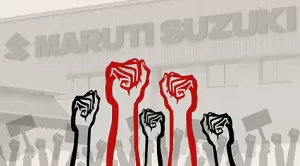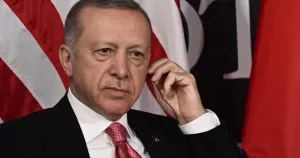❈ ❈ ❈
Peru’s Oligarchy Overthrows President Castillo
Manolo De Los Santos
June 6, 2021, was a day which shocked many in Peru’s oligarchy. Pedro Castillo Terrones, a rural schoolteacher who had never before been elected to office, won the second round of the presidential election with just over 50.13% of the vote. More than 8.8 million people voted for Castillo’s program of profound social reforms and the promise of a new constitution against the far-right’s candidate, Keiko Fujimori. In a dramatic turn of events, the historical agenda of neoliberalism and repression, passed down by former Peruvian dictator Alberto Fujimori to his daughter Keiko, was rejected at the polls.
From that day on, still in disbelief, the Peruvian oligarchy declared war on Castillo. They made the next 18 months for the new president a period of great hostility as they sought to destabilize his government with a multi-pronged attack that included significant use of lawfare. With a call to “throw out communism,” plans were made by the oligarchy’s leading business group, the National Society of Industries, to make the country ungovernable under Castillo.
In October 2021, recordings were released that revealed that since June 2021, this group of industrialists, along with other members of Peru’s elite and leaders of the right-wing opposition parties, had been planning a series of actions including financing protests and strikes. Groups of former military personnel, allied with far-right politicians like Fujimori, began to openly call for the violent overthrow of Castillo, threatening government officials and left-leaning journalists.
The right-wing in Congress also joined in these plans and attempted to impeach Castillo on two occasions during his first year in office. “Since my inauguration as president, the political sector has not accepted the electoral victory that the Peruvian people gave us,” Castillo said in March 2022. “I understand the power of Congress to exercise oversight and political control, however, these mechanisms cannot be exercised by mediating the abuse of the right, proscribed in the constitution, ignoring the popular will expressed at the polls,” he stressed. It turns out that several of these lawmakers, with support from a right-wing German foundation, had also been meeting regarding how to modify the constitution to quickly remove Castillo from office.
The oligarchic rulers of Peru could never accept that a rural schoolteacher and peasant leader could be brought into office by millions of poor, Black, and Indigenous people who saw their hope for a better future in Castillo. However, in the face of these attacks, Castillo became more and more distanced from his political base. Castillo formed four different cabinets to appease the business sectors, each time conceding to right-wing demands to remove leftist ministers who challenged the status quo. He broke with his party Peru Libre when openly challenged by its leaders. He sought help from the already discredited Organization of American States in looking for political solutions instead of mobilizing the country’s major peasant and Indigenous movements. By the end, Castillo was fighting alone, without support from the masses or the Peruvian left parties.
The final crisis for Castillo broke out on December 7, 2022. Weakened by months of corruption allegations, left infighting, and multiple attempts to criminalize him, Castillo was finally overthrown and imprisoned. He was replaced by his vice president, Dina Boluarte, who was sworn in after Congress impeached Castillo with 101 votes in favor, six against, and ten abstentions.
The vote came hours after he announced on television to the country that Castillo was dissolving Congress. He did so preemptively, three hours before the start of the congressional session in which a motion to dismiss him for “permanent moral incapacity” was to be debated and voted on due to allegations of corruption that are under investigation. Castillo also announced the start of an “exceptional emergency government” and the convening of a Constituent Assembly within nine months. He said that until the Constituent Assembly was installed, he would rule by decree. In his last message as president, he also decreed a curfew to begin at 10 o’clock that night. The curfew, as well as his other measures, was never applied. Hours later, Castillo was overthrown.
Boluarte was sworn in by Congress as Castillo was detained at a police station. A few demonstrations broke out in the capital Lima, but nowhere near large enough to reverse the coup which was nearly a year and a half in the making, the latest in Latin America’s long history of violence against radical transformations.
The coup against Pedro Castillo is a major setback for the current wave of progressive governments in Latin America and the people’s movements that elected them. This coup and the arrest of Castillo are stark reminders that the ruling elites of Latin America will not concede any power without a bitter fight to the end. And now that the dust has settled, the only winners are the Peruvian oligarchy and their friends in Washington.
[Manolo De Los Santos is the co-executive director of the People’s Forum and is a researcher at Tricontinental: Institute for Social Research. He co-edited, most recently, ‘Viviremos: Venezuela vs. Hybrid War’ (LeftWord Books/1804 Books, 2020) and ‘Comrade of the Revolution: Selected Speeches of Fidel Castro’ (LeftWord Books/1804 Books, 2021). He is a co-coordinator of the People’s Summit for Democracy. Courtesy: Globetrotter, a project of Independent Media Institute, a nonprofit organization that educates the public through a diverse array of independent media projects and programs.]
❈ ❈ ❈
A Reactionary Coup Is Consummated
Gustavo Espinoza Montesinos
This Wednesday was a particularly complicated day in Peru. In a few hours the ultra-right partially achieved its goal: to overthrow the government of Pedro Castillo and open the way to a new scenario in national life, in which it can preserve its privileges and recover its positions of power, in some way questioned by the regime established as of July 28 last year.
After a few hours of tension, Dina Boluarte, the Vice-President of the Republic, was installed as head of State and called for the “unity of all Peruvians”.
This outcome was somewhat unexpected. And it was precipitated because Castillo himself made what could be called a leap into the void. Without coordinating with anyone, without seeking the support of the social and mass organizations, without the support of the Armed Forces or of the political collectives with progressive and advanced positions, he decided to establish an Emergency Government, dissolving the other branches of government.
This surprised the citizens and the popular movement as a whole, and was responded to by the most reactionary sectors of national life.
The Congress of the Republic, which was to discuss today the vacancy of the Presidency of the Republic, for which it could not count on the 87 votes required, saw its task made easier. In the new scenario, 101 congressmen joined the vacancy proposal, with only 6 votes against and 9 abstentions.
There was a possibility that the reaction would pressure Dina Boluarte to resign as Vice President, in which case the power would immediately pass to the President of Congress, former General José Williams Zapata. This pressure did not exist, and in the afternoon, the first woman to be sworn in as President of the Republic was sworn in.
Dina Boluarte has made a call for “national unity”, understood as the sum of all the political forces acting in the Peruvian scenario. We will see what will be the composition of her first Ministerial Cabinet.
For the time being, the Peruvian ultra-right has sung victory. It is aware that it has managed to get rid of a president it detested and wanted to overthrow since the beginning of his administration. However, it has not been able to fully impose itself. Although Dina Boluarte is not a “militant of the left”, she cannot be compared to Jannine Añez, the Bolivian who replaced Evo Morales in La Paz.
It is not foreseeable, however, that she will follow Castillo’s path, nor that she will engage in any popular battle. She will try to “ride the wave” until 2026, trying not to be devoured by the Mafia on the prowl.
From this accumulation of circumstances, some lessons can be deduced. Let’s see:
Castillo represented a Popular, Democratic and Progressive Government. He could not be considered, by the way, neither leftist, revolutionary nor socialist. It was not indispensable for the Left to support him in terms of personal adhesion, but to help him in his administration for the fulfillment of his Unity Program, subscribed by all the forces of the popular movement, which would give him victory in June 2021.
He led a weak, precarious and largely inconsistent government. In truth, he did not manage to govern because from the first day he was harassed by an intense campaign of hatred unleashed against him by the traditional oligarchic nuclei. He never counted on the real collaboration of the left -which he sought very little- and he surrounded himself with a group of very questionable “advisors” who finally became evident for their ineptitude and corruption. By their actions, he was severely compromised.
Randomly, Castillo reacted belatedly to the enemy’s campaign. In doing so, he opted for the path of “direct dealings” between himself and the populations of the interior of the country, ignoring the natural links created by the popular movement itself. Moreover, his “collaborators” acted outside the masses because they did not come from the heart of the people either.
That is why he could not realize the real situation, nor perceive his political isolation. He thought that by relying on people who could “scare” his enemies, he could neutralize them, and that did not happen.
In this way it was confirmed that it is not possible to lead a process of change without forging the unity of the popular movement, without organizing the masses and politicizing them. Nor, turning our backs on their struggles.
The future of the country is at risk. In the interior there will undoubtedly be mobilizations in support of the deposed President. Their fear of them was what induced their reaction not to assume power directly, but to accept Dina Boluarte as a “mediator”, but she has neither a Party nor an organized force to back her up. It is foreseeable that she will have even greater difficulties than Castillo in the perspective.
It is foreseeable that the new administration will register negative changes. The media, which claimed to be on the verge of bankruptcy for not receiving subsidies from the State, will obtain juicy compensations. But both will not change their attitude. They will continue their struggle against the people so that greater difficulties are foreseen in the future.
In terms of foreign policy, this will also be felt. A “cooling” of ties with some sister countries is foreseeable, especially Mexico, Venezuela, Nicaragua, or even Cuba; because the ultra-right will continue its campaign against them.
In other words, the battle of the Peruvians will be harder and more difficult, but it will have to be faced.
(Courtesy: Resumen Latinoamericano, a newsletter whose focus is news and analysis coming primarily from Latin America by writers, researchers, and activists living there.)




